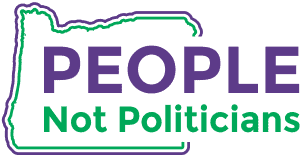Common Cause and Oregon Redistricting Reform Allies File Federal Lawsuit
On June 30, 2020, the People Not Politicians Oregon campaign sued Oregon’s secretary of state to ensure that all of the signatures gathered to qualify its redistricting reform initiative for the November 2020 ballot will count. See the campaign statement here.
Read the complaint and the motion for a temporary restraining order.
People Not Politicians has been working over the last year to place an initiative on the November 2020 ballot to establish an independent citizens redistricting commission in Oregon ahead of the 2021 redistricting cycle. This coalition, which includes Common Cause Oregon, was cleared to begin collecting signatures for Initiative Petition 57 (IP 57) in April 2020, after Oregon Governor Kate Brown put a series of health-related executive orders in place to slow the spread of COVID-19.
Learn more about the reform proposal.
Circulating an initiative petition to collect the necessary signatures to make it on the November ballot is traditionally done by paid and volunteer petition circulators who go out into high traffic, public spaces to have one-on-one conversations with people to garner support. With the Governor’s Stay Home, Save Lives order mandating six feet of separation from strangers, the closure of large public gatherings and most social activities, collecting signatures in-person through traditional means became impossible.
Following the success of cases in other states, the Common Cause Redistricting & Representation team, with the pro bono assistance of Adam Lauridson and the firm of Keker Van Nest; Steve Elzinga of Sherman, Sherman, Johnnie & Hoyt; and Chris Cobey quickly pulled together a case for a reasonable relaxation of constitutional rules for qualifying a ballot initiative. The plaintiffs requests include extending the deadline and easing the signature requirements.
Currently, Oregon requires a ballot initiative’s advocates to gather a number of signatures equaling at least eight percent of the total number of votes cast for Governor in the most recent election for the initiative be placed on the ballot. In the 2020 election cycle, this amounts to 149,360 signatures that must be delivered to the Secretary of State by July 2, 2020.
Plaintiffs in the case – People Not Politicians OR, along with PNP Executive Committee members Common Cause, League of Women Voters of Oregon, the Eugene/Springfield NAACP, Independent Party of Oregon and IP 57 Chief Petitioner Norman Turrill – argue that these requirements effectively make it impossible to qualify for the November 2020 ballot. They assert their right to access the ballot under the First and Fourteenth Amendments to the U.S. Constitution.
Building on the success of cases in Nevada, where a federal court granted an extension of the signature submission deadline, and in Michigan, where a federal court granted a reduction in the signature threshold, and similar cases in other states, People Not Politicians Oregon v. Clarno seeks the same relief from a federal district court in Oregon.
On June 30, 2020, Plaintiffs filed the complaint and motion for a temporary restraining order stopping the enforcement of the signature requirement and submission deadline.
